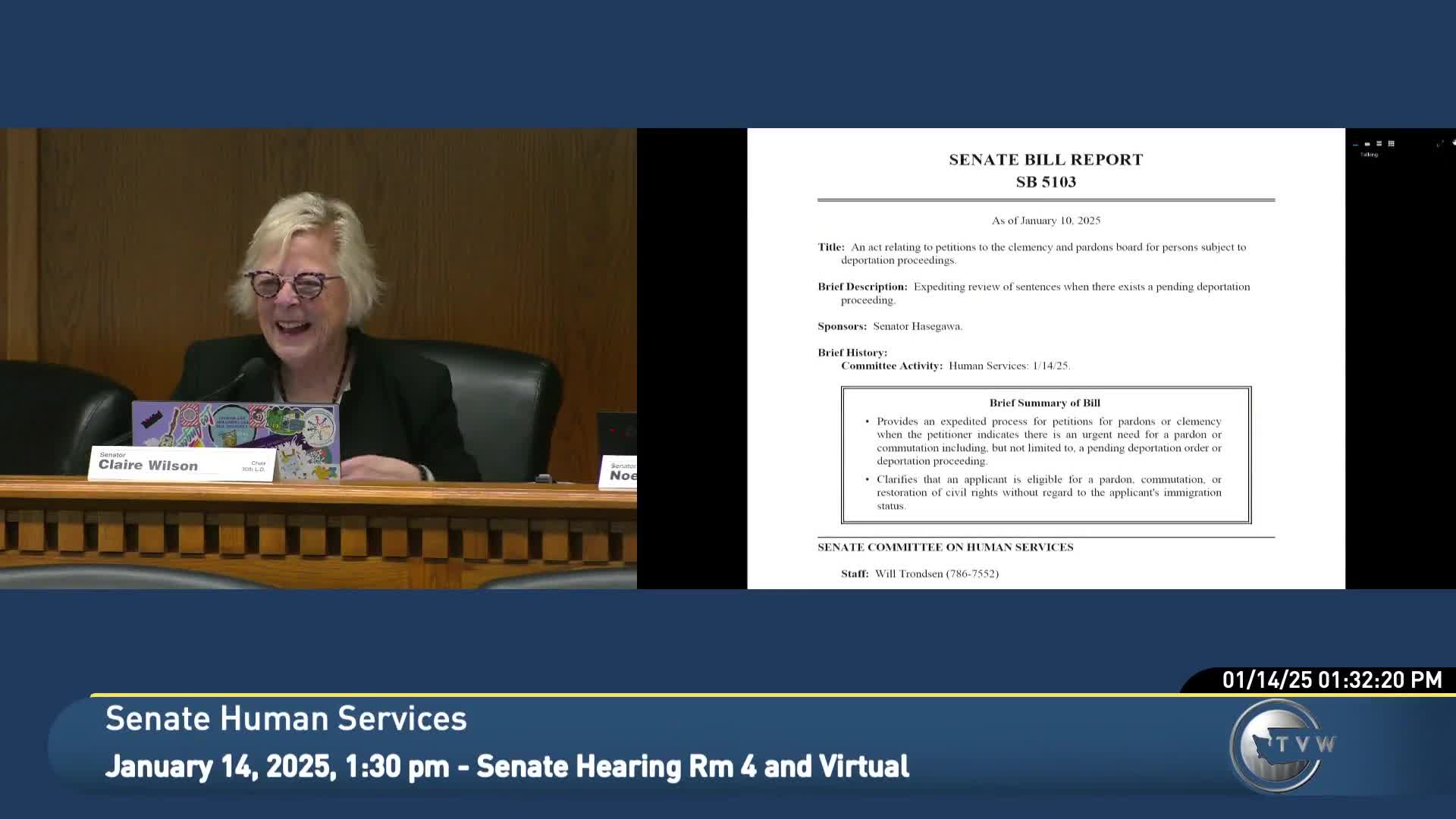Committee hears briefing on bill to speed pardons and clemency petitions for people facing deportation
Get AI-powered insights, summaries, and transcripts
Subscribe
Summary
Senate Bill 5103 would create an expedited process for pardons, commutations or restoration of civil rights when petitioners face urgent deportation risks and clarifies eligibility regardless of immigration status. Committee staff briefed members and proponents urged faster review capacity for long‑time residents with old convictions.
Senate Bill 5103, which would create an expedited clemency process for petitioners who face an urgent deportation threat, was briefed Tuesday before the Washington State Senate Human Services Committee.
Will Tronson, staff counsel to the committee, told members that "Senate Bill 5103 addresses the pardons and clemency process" and that the measure would allow the Clemency and Pardons Board to use an expedited pathway when a petitioner indicates an urgent need, "including but not limited to, a pending deportation order or deportation proceeding." Tronson said a fiscal note found no significant financial impact.
The bill matters, proponents said, because long‑time Washington residents with old criminal convictions can face mandatory removal under federal immigration law regardless of rehabilitation, family ties or community ties. "Clemency is a critical tool to helping families keep families together and prevent unjust deportations," Senator Bob Hasegawa told the committee, urging members to consider the bill's potential to spare families "permanent separation" where deportation would be disproportionate.
Immigration‑defense advocates who testified said Washington's existing clemency pipeline is small and slow. Stacy Toiber, an immigration resource attorney with the Washington Defender Association, told the committee there is "an urgent need for the Clemency and Pardons Board to have increased capacity and a capacity to hear pardons on an expedited basis for noncitizens who are facing imminent removal." She and others urged the board and the Legislature to prepare for increased removal enforcement.
Background and details of the proposal Senate Bill 5103 would direct the Clemency and Pardons Board to offer an expedited review option where petitioners indicate urgency, such as a pending removal action. The committee's staff briefing reminded members that the Washington State Constitution grants the governor pardon power and that the Clemency and Pardons Board — created by the Legislature in 1981 — accepts petitions and recommends action to the governor. Under current practice the board holds quarterly public hearings and considers written materials submitted both for and against petitions.
Advocates and the sponsor cited several reasons the bill is needed: the board typically hears a small number of petitions each year ("around 25 to 27 clemency cases per year," the sponsor said), many detained people have long ties to Washington (staff cited an estimate that about 37% of people detained at the Northwest Detention Center in Tacoma had lived in the U.S. 15 years or more as of March 2024), and federal removal law can make deportation mandatory for many convictions regardless of rehabilitation. The bill also clarifies that eligibility for a pardon, commutation, or restoration of civil rights will not depend on a petitioner’s immigration status.
What the committee heard - Committee counsel: Will Tronson summarized the bill and its intent and said the fiscal note returned with no significant financial impact. - Sponsor: Senator Hasegawa framed the bill as a response to immigrant communities vulnerable to enforcement and described organizations supporting the measure. - Testimony: Stacy Toiber (Washington Defender Association) and other advocates urged expedited review capacity and said the board's current throughput and resources are insufficient to meet an urgent removal threat to long‑time residents.
No formal action was taken during the briefing; the bill was scheduled for future testimony and committee consideration.
Ending Committee staff and proponents said they will provide additional materials and data to the committee as the bill moves through the process. Proponents asked the committee to consider both an expedited process and increased board capacity so that petitions filed in urgent circumstances can be reviewed before removal actions advance.
